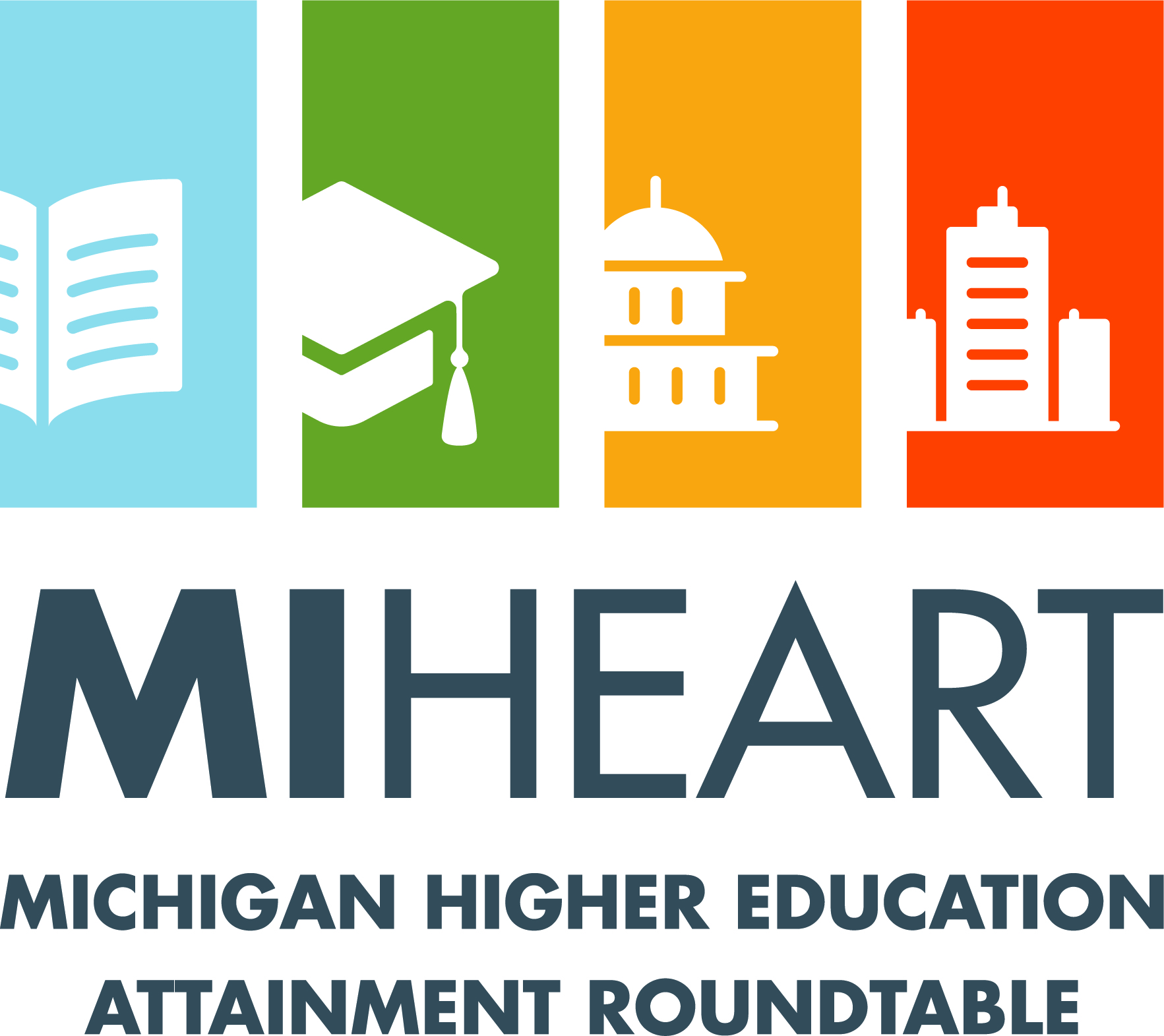About MIHEART
Since 2014, stakeholders across Michigan’s higher education policy community have been meeting to set an agenda that will ensure at least 60 percent of working-age adults in Michigan earn a skill certificate or college degree by 2030 (Sixty by 30). The Michigan Higher Education Attainment Roundtable (MIHEART) is comprised of business, nonprofit, philanthropy, PK–12 education, higher education, and government leaders passionate about attracting and retaining talent in Michigan.
Since it was initiated, MIHEART has been focused on advocating for more resources to be put toward improving the talent pipeline in Michigan. The group works collaboratively to promote, advocate for, and lead policy changes that will generate improved postsecondary education and credential attainment levels in Michigan. The members of MIHEART are committed to working with stakeholders across the state, including Michigan’s Governor and Legislature, to create and attract jobs and make Michigan a top ten state for educational attainment.
MIHEART Recommendations (2025-2026)
To help Michigan reach Sixty by 30, MIHEART has created the MI Talent Sustainability Agenda, which aims to guide decisions by policymakers and advocates as they seek to improve talent attainment and retention in the state.
This top ten list of recommendations offers a renewed call to action and a state-level agenda for ensuring Michiganders have the education and skills needed to succeed. The recommendations are aimed at equitably increasing college access for more Michiganders, helping students persist on an annual basis, and increasing the number of college completers.
Overarching Goals: Increase the number of working-age adults with a skill certificate or college degree to 60% by 2030 and make postsecondary education attainment more accessible and affordable.
Top Recommendations:
- Improve postsecondary participation and completion rates by closing opportunity and achievement gaps among low-income students, first-generation college-going students, students with disabilities, and students of color.
- Increase the proportion of Michigan high school students who complete the Free Application for Federal Student Aid (FAFSA) annually to 75% and seek consensus on a statewide policy, funding, and partnership framework that will help achieve this goal.
- Continue building out and sustain investment in the Michigan Achievement Scholarship to the planned 2028 target of $562 million, making college affordable to more students in Michigan.
- Increase and sustain postsecondary institutional annual operating support to at least 1 percentage point above the rate of inflation annually and emphasize support for the whole education system to build a foundation that sets low-income students, first-generation college-going students, students with disabilities, and students of color on a path for success.
- Permanently lower the age for Michigan Reconnect from age 25 to 21, ensuring non-degreed adults who have a high school diploma and those who left college without a degree have an opportunity to earn a tuition-free associate degree or postsecondary certificate.
- Allocate additional resources and align programs to support adult worker training and retraining (e.g., Going Pro Talent Fund, New Jobs Training Program, Community College Skilled Trades Equipment Program, Michigan Achievement Skills Scholarship, and Reconnect Short-Term Training Program).
- Increase high school student participation in and completion of all forms of early college credit, especially among low-income students, first-generation college-going students, students with disabilities, and students of color.
- Reduce the student-to-counselor ratio for all students and provide high-quality training and professional development for existing counselors to deliver developmentally appropriate services and meet students' academic, career, personal, and social support needs.
- Continue progress toward multi-institutional credit acceptance between higher education institutions, associate to bachelor’s degree transfer pathways, and secondary to postsecondary credit acceptance, and expand access to the Michigan Transfer Network, the Michigan Transfer Agreement, and the MiTransfer Pathways to make the transfer process more efficient, simplified, and transparent.
- Elevate and share national and state best practices and strategies among all partners of the Office of Higher Education, ensuring that every student has the skill certificate or degree needed to prosper and help employers hire the talent they need to succeed.
Download the MI Talent Sustainability Agenda 2025–26
Other Resources
2022-23 DOCUMENTS
- Michigan's Talent Priority Top 10 Recommendations (2022)
- Michigan’s Talent Priority Top 10 Recommendations Summary (2022)
- Michigan’s Talent Priority Top 10 Recommendations Presentation (2022)
MIHEART TOTAL TALENT REPORT (2018)
The 2018 Total Talent Report provided a fresh call to action and a set of state policy priorities and stakeholder initiatives to make Michigan a talent leader. The report below lays out the progress and accomplishments to date, reflects on Michigan’s Talent Attainment performance, looks ahead, and offers a call to action and a “total talent” state agenda for ensuring all our citizens get the education and skills to succeed in the economy of today and tomorrow.
TALENT SUMMIT
HISTORICAL REPORTS
MIHEART Members
MIHEART’s membership includes the key institutions and stakeholders committed to work together on an ongoing basis in to increase attainment of postsecondary credentials of workforce value. The collaborative includes:
- Business Leaders for Michigan (BLM)
- Detroit Regional Chamber of Commerce
- Executive Office of the Governor
- Launch Michigan
- Michigan Association of Intermediate School Administrators (MAISA)
- Michigan Association of Superintendents & Administrators (MASA)
- Michigan Association of Secondary School Principals (MASSP)
- Michigan Association of State Universities (MASU)
- Michigan College Access Network (MCAN)
- Michigan Community College Association (MCCA)
- Michigan Department of Education
- Michigan Department of Lifelong Education, Advancement, and Potential (MiLEAP)
- Michigan Department of Treasury
- Michigan Economic Development Corporation
- Michigan Future Inc.
- Michigan Independent Colleges & Universities (MICU)
- Michigan Works! Association
- Michigan's Children
- Public Policy Associates
- Small Business Association of Michigan
- TalentFirst
- The Institute for College Access & Success (TICAS)
- The Kresge Foundation
Michigan Higher Education Attainment Roundtable (MIHEART) is group of representatives across sectors that work as an ongoing collaborative to promote, advocate for, and guide policy changes that will improve our state’s postsecondary education, and credential attainment levels.
